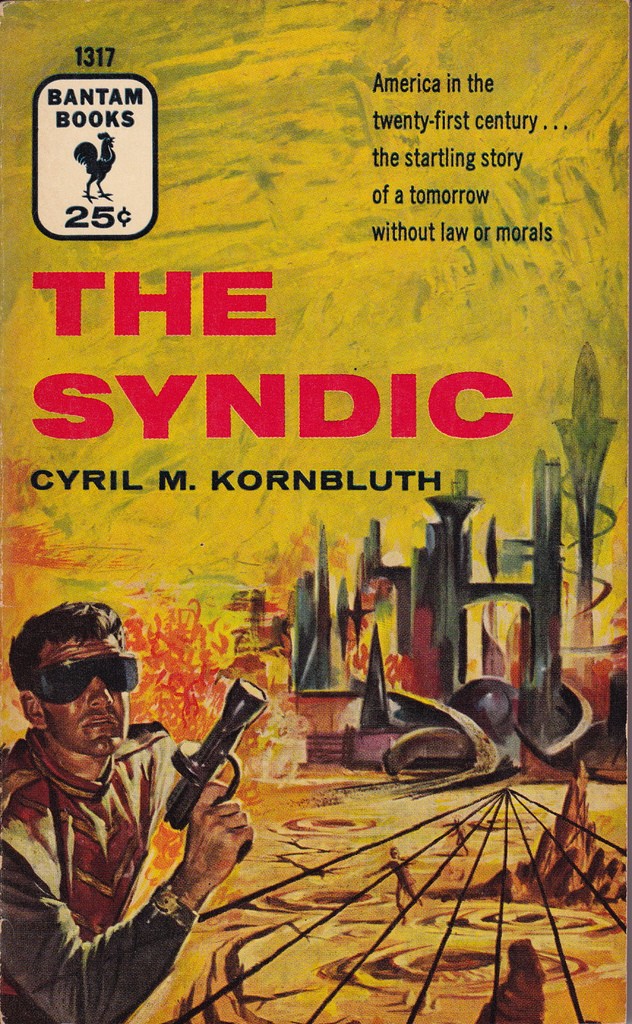 There was something absolutely wonderful about the kind of science fiction that was published in the American SF magazines in the 1950’s. While the “mainstream” fiction writers struggled to obey increasingly rigid notions of “realism” and the short story virtually disappeared as an art form in the literary world, Science Fiction writers flourished in their small ghetto, free to let their imaginations roam, and free to satirize society with infinite jest. That wonderful creative cauldron gave us Theodore Sturgeon, Philip K. Dick, Avram Davidson, Edgar Pangborn, William Tenn, Alfred Bester, and many, many more. These were among the finest writers America ever produced. There was one writer that almost all these men looked up to and admired, and that was Cyril M. Kornbluth. Sadly, his career ended with premature death in 1958, after only seven years of writing. But in those seven years he produced several masterpieces in collaboration with Fredrik Pohl —such as the brilliant satire of advertising, The Space Merchants, and the remarkably prescient Gladiator-at-Law. He also produced several fine novels on his own, much more biting (perhaps because Pohl’s mellower personality influenced the collaborations), as well as a plethora of brilliant short stories. ‘The Little Black Bag’ and ‘The Marching Morons’ are perfect examples of his superb artistry.
There was something absolutely wonderful about the kind of science fiction that was published in the American SF magazines in the 1950’s. While the “mainstream” fiction writers struggled to obey increasingly rigid notions of “realism” and the short story virtually disappeared as an art form in the literary world, Science Fiction writers flourished in their small ghetto, free to let their imaginations roam, and free to satirize society with infinite jest. That wonderful creative cauldron gave us Theodore Sturgeon, Philip K. Dick, Avram Davidson, Edgar Pangborn, William Tenn, Alfred Bester, and many, many more. These were among the finest writers America ever produced. There was one writer that almost all these men looked up to and admired, and that was Cyril M. Kornbluth. Sadly, his career ended with premature death in 1958, after only seven years of writing. But in those seven years he produced several masterpieces in collaboration with Fredrik Pohl —such as the brilliant satire of advertising, The Space Merchants, and the remarkably prescient Gladiator-at-Law. He also produced several fine novels on his own, much more biting (perhaps because Pohl’s mellower personality influenced the collaborations), as well as a plethora of brilliant short stories. ‘The Little Black Bag’ and ‘The Marching Morons’ are perfect examples of his superb artistry.
 A fine introduction to Kornbluth’s work would be this novel, The Syndic, published in 1953. It posits a future in which governments have collapsed under their own weight of bureaucracy and been replaced by the Mafia. In 1953, it was far-out whimsy. How would an Eastern European read it today? The real pleasure in reading Kornbluth is that his sharp satire is delivered in a crisp, purely colloquial style, as if Damon Runyan where writing sociological Science Fiction. A serious writer, today, would make heavy going of this stuff, stretching it out and filling it with stylistic tricks and learned references. Kornbluth wrote like an experienced barber.… a few deft strokes with a very sharp blade, done like magic, and over before you can catch your breath. Fifty-three years have passed since this novel hit the stands, and it is not quaint. It’s still a good, clean shave.
A fine introduction to Kornbluth’s work would be this novel, The Syndic, published in 1953. It posits a future in which governments have collapsed under their own weight of bureaucracy and been replaced by the Mafia. In 1953, it was far-out whimsy. How would an Eastern European read it today? The real pleasure in reading Kornbluth is that his sharp satire is delivered in a crisp, purely colloquial style, as if Damon Runyan where writing sociological Science Fiction. A serious writer, today, would make heavy going of this stuff, stretching it out and filling it with stylistic tricks and learned references. Kornbluth wrote like an experienced barber.… a few deft strokes with a very sharp blade, done like magic, and over before you can catch your breath. Fifty-three years have passed since this novel hit the stands, and it is not quaint. It’s still a good, clean shave.
0 Comments.